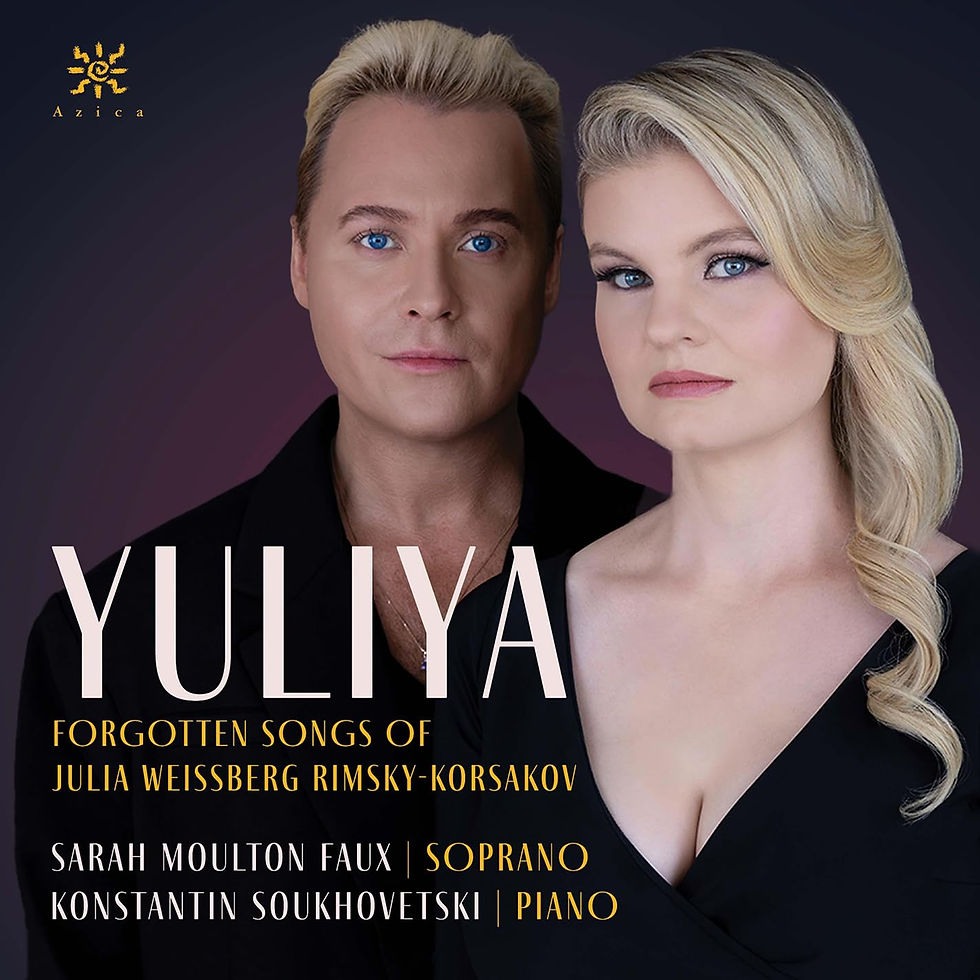In Review : Alex Weiser’s "And All The Days Were Purple"
- Apr 12, 2019
- 3 min read
Updated: Jun 15, 2020

In his debut release And All The Days Were Purple, Alex Weiser couriers his dynamic approach in close proximity to the narrative arch of its underlying text, Yiddish and English poems by Anna Margolin, Edward Hirsch, Rachel Korn, and Abraham Sutzkever.
A deeply personal quest submerges throughout queries within the framework of modern (American) culture and secular Jewish identity.
Eliza Bagg’s strident voice leads through the song-cycle’s deft interspersing sound textures realized by Lee Dionne, piano, Michael Compitello, percussion, Maya Bennardo, Violin, Hannah Levinson, viola and Hannah Collins, cello. Highlighting the poems varied characteristics – whimsical, at times wailing and full of wonderous turns, Weiser identifies structural ideas or emotional content to be captured in the musical conceit that drives the setting. (Album Art by Meredith Leich)
“I often latch onto a particular image or idea in each poem, for example, the first song My Joy / מײַן גליק proceeds in a kind of meditative processional, inspired by the image in the poem that uses strolling around a square as a poignant metaphor for walking through life and the joy (and also sadness) of the Quotidien.
In Longing / בענקשאַפֿט I represent the beautiful desire of the poem in searching, flowing upward scales and in a chromatic chord progression seeking tonal resolution,” explains Weiser.
Also included on this recording is Weiser’s triptych work from 2016, titledThree Epitaphs, set to texts on love and life’s transience by Williams Carlos Williams, Seikilos and Emily Dickinson. It was originally performed by Kate Maroney and Cantata Profana for Kettle Corn New Music, a performance series and collaborative platform co-founded and directed by Weiser, with a mission to present music drawn from a broad range of styles and aesthetic backgrounds and presented in an atmosphere where it can be heard as both entertaining and thought-provoking. The contemporary music scene is one of collaboration and exchange and accordingly, Weiser’s artistic and curatorial activities have been going hand in hand. And All The Days Were Purple was commissioned by Roulette Intermedium Inc. with a performance at Roulette’s Brooklyn performance hub with the support of The Jerome Foundation, as part of their five artist residencies and four commissions at Roulette.
Released on the cantaloupe music label, launched in 2001 by the three founders of New York’s legendary Bang on a Can organization—composers Michael Gordon, David Lang and Julia Wolfe—with Bang on a Can managing director Kenny Savelson, And All The Days Were Purple has established Weiser firmly within the new music community, whose output is widely recognized by critics and fans for its edgy and adventurous sounds.

“I’m a huge fan of Steve Reich, and of Michael Gordon, Julia Wolfe, and David Lang — so it’s a particular honor for me to be releasing my debut record on Cantaloupe Music,” he says. During his studies at Yale University and New York University, teachers and mentors included Michael Gordon, Julia Wolfe, Michael Klingbeil, Kathryn Alexander, Martin Bresnick, David Lang, Ingram Marshall, and Christopher Theofanidis.
Previously a director at MATA Festival, an emerging composer’s showcase for nearly five years, Weiser’s current curatorial position (since 2016) puts him within an arm length of the YIVO’s vast historic collection of thematic diversity, connected with Jewish culture and history.
It was here that Weiser found inspiration in learning Yiddish and becoming acquainted with the wider world of Jewish studies and the historic artifacts of the “abandoned ruins,” of a once vivid culture.
“It felt like a homecoming,” he says, during last week’s release party for the album, at YIVO. But these new experiences did not build on childhood reminiscences of a Jewish identity defined by its pseudo “Bagel and Lox” heritage, but rather connected with the meaningful historic framework of Jewish secular poetry. And All The Days Were Purple “embarks on a literary journey to find meaning amidst life’s transience and tumult, with secular Jewish poetry as a point of departure, connecting to a world in which history, language, and culture can unite Jews across time, space, and the religious and political differences that can otherwise narrow and divide these meaningful and expansive connections,” he explains.
“In the opening song, the Yiddish language poem by Anna Margolin surmises that it is only in the always looming specter of death that the joy of the “Quotidien” comes into focus. In another Anna Margolin poem, set later on the album, this interplay between life and death is said to bring us closest to godliness. For me these poems, and all the songs on the album, are like secular prayers,” he says. “I think that framing this search for meaning within a Jewish language and with Jewish themes adds a tremendous power. It grounds a modern encounter with these eternal questions within a rich lineage of struggling with God – some of which I embrace, some of which I question, all of which I am proud to be connected to.”
This review was previously published on Sequenza21



Comments